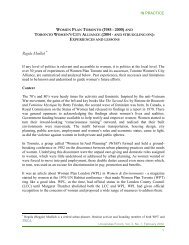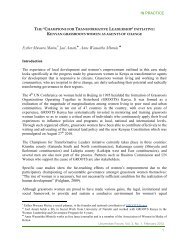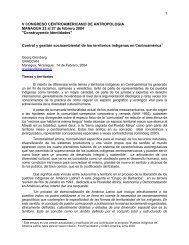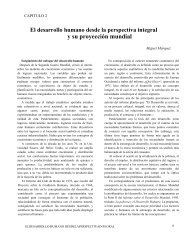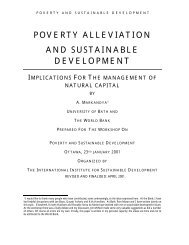The Cluster Initiative Greenbook
The Cluster Initiative Greenbook
The Cluster Initiative Greenbook
You also want an ePaper? Increase the reach of your titles
YUMPU automatically turns print PDFs into web optimized ePapers that Google loves.
Resources and facilitators<br />
Almost all CIs, 89%, have some kind of facilitator, a person devoted to working at<br />
least part-time to manage the CI. Often the CI also has an office of some kind. (See<br />
Figure 37 on previous page.)<br />
Typically, the CI sets up taskforces to work on particular issues. It is also common<br />
for CIs to exchange experiences with CIs in other industries, as well as with CIs in the<br />
same industry but in other regions.<br />
However, there is a limit to the resources available to the CIs. <strong>The</strong> budget is usually<br />
sufficient only for the day-to-day work. For “significant projects,” CIs typically have to<br />
seek separate funding.<br />
Background of CI facilitator(s)<br />
54%<br />
21% 21%<br />
27%<br />
Industry insider Civil servant <strong>Cluster</strong> consultant Other<br />
Figure 38<br />
CI facilitator background<br />
More than one background could be<br />
selected – a facilitator can have multiple<br />
backgrounds and a CI can<br />
have more than one facilitator –<br />
which is why the total exceeds<br />
100%.<br />
Source: GCIS 2003<br />
<strong>The</strong> typical CI facilitator has a background within the cluster industry. Civil servants,<br />
with backgrounds in government, and cluster consultants are less frequent. Some facilitators<br />
have other backgrounds.<br />
Agree<br />
Disagree<br />
Pushes development of CI forward<br />
96%<br />
Fac. has strong network of contacts<br />
93%<br />
Fac. has deep knowledge of cluster<br />
Fac. enjoys high respect amomg CI members<br />
Fac. is considered to be neutral<br />
Fac. has clout in political sphere<br />
91%<br />
91%<br />
85%<br />
44%<br />
Figure 39<br />
CI facilitator’s strengths and<br />
weaknesses<br />
Please note that in many cases it is<br />
the cluster facilitator who is the respondent.<br />
Source: GCIS 2003<br />
<strong>Cluster</strong> facilitators feel that they play an important role in pushing the development of<br />
the CI forward. <strong>The</strong>y generally consider themselves well connected, knowledgeable<br />
and respected by the CI members. <strong>The</strong>y are also considered to be neutral, not representing<br />
any particular party.<br />
In many cases, facilitators feel that they lack political clout. This is less of a problem<br />
for industry insiders than for civil servants or consultants. (See Figure 39 above.)<br />
Building a framework – is everyone on the same page?<br />
To bring a cluster together in cooperation requires that there is some form of shared<br />
idea about why the cluster initiative is beneficial and how it is supposed to work. Most<br />
CIs base such a framework on an analysis of their own cluster’s specific strengths and<br />
capabilities. (See Figure 40 on next page.) Some, however, also look at international<br />
models and adopt them as a blueprint for their own CI. <strong>The</strong>re seems to be little<br />
<strong>The</strong> <strong>Cluster</strong> <strong>Initiative</strong> <strong>Greenbook</strong> • 41



